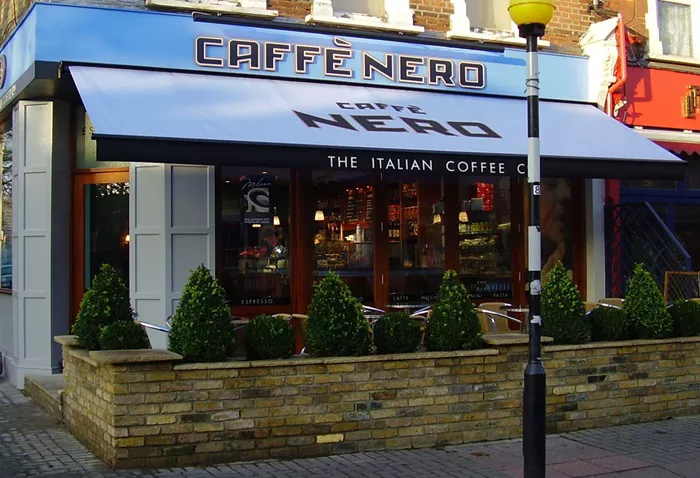Caffè Nero is one of the most recognizable coffeehouse brands in the UK, known for its European-inspired menu, cozy ambiance, and dedication to high-quality coffee. With locations spread across many cities, Caffè Nero has built a strong reputation, gaining a loyal following and expanding internationally. But who owns Caffè Nero, and how did it grow from a single location into a global coffee empire?
In this article, we will take a deep dive into the ownership of Caffè Nero, the brand’s journey from a small shop to an international powerhouse, and the vision that has propelled its growth. We’ll also explore some challenges the company has faced, including its recent legal and financial hurdles.
Introduction to Caffè Nero
Caffè Nero was founded in 1997 in London, England, by Gerry Ford, an American businessman with a passion for coffee. The idea behind Caffè Nero was to bring the European café culture to the UK. Gerry Ford envisioned a space where people could enjoy rich, authentic espresso in a relaxed setting—a place that felt like a second home.
From the beginning, Caffè Nero set itself apart from other coffee chains by focusing on quality and atmosphere. Ford wanted each store to feel unique, with comfortable furniture, warm lighting, and a welcoming environment. By the early 2000s, Caffè Nero had started to grow steadily, opening new stores and developing a loyal customer base. However, the company’s story is as much about its ownership and business strategies as it is about coffee.
The Ownership Journey of Caffè Nero
Understanding who owns Caffè Nero requires looking at its history and the key individuals and firms involved in its ownership over the years.
1. Gerry Ford: The Founder and Visionary
Gerry Ford is the original founder of Caffè Nero and remains the face of the company today. Born in the United States, Ford studied at Oxford University and then earned a Ph.D. from Stanford University. His academic and business background gave him a unique perspective on how to run a coffee business with a European touch in the UK. When he started Caffè Nero, he aimed to differentiate it from other coffee shops by emphasizing the European experience.
Ford not only founded the company but also played a vital role in its expansion. He was dedicated to maintaining quality, establishing the company’s own roastery, and ensuring that every cup of coffee met the highest standards. Ford’s commitment to quality and consistency laid the foundation for Caffè Nero’s success. Despite his dedication, running a growing coffee empire required significant capital, which led him to seek outside investors.
2. Private Equity and Expansion
As Caffè Nero continued to grow, it attracted the attention of private equity firms, which saw potential in the brand. In 2001, the company went public on the London Stock Exchange to raise funds for expansion. However, in 2007, Ford led a management buyout of the company with the help of private equity firm Paladin Associates. This buyout allowed the company to become privately owned once again, giving Ford and his investors greater control over its operations.
Since the buyout, Paladin has remained a significant stakeholder in Caffè Nero. The relationship between Ford and Paladin has allowed the company to maintain its independence and avoid the pressure of meeting quarterly earnings expectations, which is often required of publicly traded companies. This flexibility has allowed Caffè Nero to focus on long-term growth rather than short-term profits.
3. International Expansion
Caffè Nero’s success in the UK soon inspired plans for international growth. Starting in Turkey in 2007, the brand began to establish a presence outside of the UK. Today, Caffè Nero operates in several countries, including the United States, Ireland, Poland, and Cyprus. This expansion was a strategic move, allowing Caffè Nero to compete with other global coffee giants like Starbucks and Costa Coffee.
However, international expansion brought new challenges, particularly in navigating different markets and consumer preferences. Each country’s coffee culture is unique, and Caffè Nero needed to adapt to these differences while retaining its brand identity. Ford’s hands-on leadership style and his focus on quality and customer experience helped the company maintain its standards even as it grew internationally.
4. The COVID-19 Pandemic and Financial Challenges
Like many businesses, Caffè Nero faced significant challenges during the COVID-19 pandemic. Lockdowns and social distancing restrictions led to a sharp decline in foot traffic, putting financial strain on the company. To survive, Caffè Nero entered a company voluntary arrangement (CVA), a form of restructuring used in the UK to manage debt.
This move sparked a legal battle, as some of the company’s landlords challenged the CVA, arguing that it was unfair. During this time, the Issa brothers, who own the EG Group (a British-based convenience and fuel retailer), made a bid to take over Caffè Nero by buying its debt. The bid led to a public dispute, with Ford and the company’s management team working to maintain control.
In the end, Ford retained ownership of Caffè Nero, and the company was able to restructure its debts. However, the situation underscored the challenges of maintaining control over a private company, especially when external financial pressures arise.
Conclusion
Caffè Nero’s story is one of passion, resilience, and strategic growth. Founded by Gerry Ford with a vision of bringing European coffee culture to the UK, the company has grown into a beloved brand with a global presence. Through private equity partnerships and a focus on quality, Caffè Nero has managed to expand while staying true to its roots. Despite facing significant challenges, including a recent legal dispute and the impact of the COVID-19 pandemic, Caffè Nero continues to thrive under Ford’s leadership.
Related Topics:
Where is Blue Bottle Coffee From?
Which Roast Coffee is Healthiest?
Which Is the Best Bialetti Coffee Maker?


